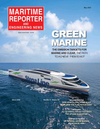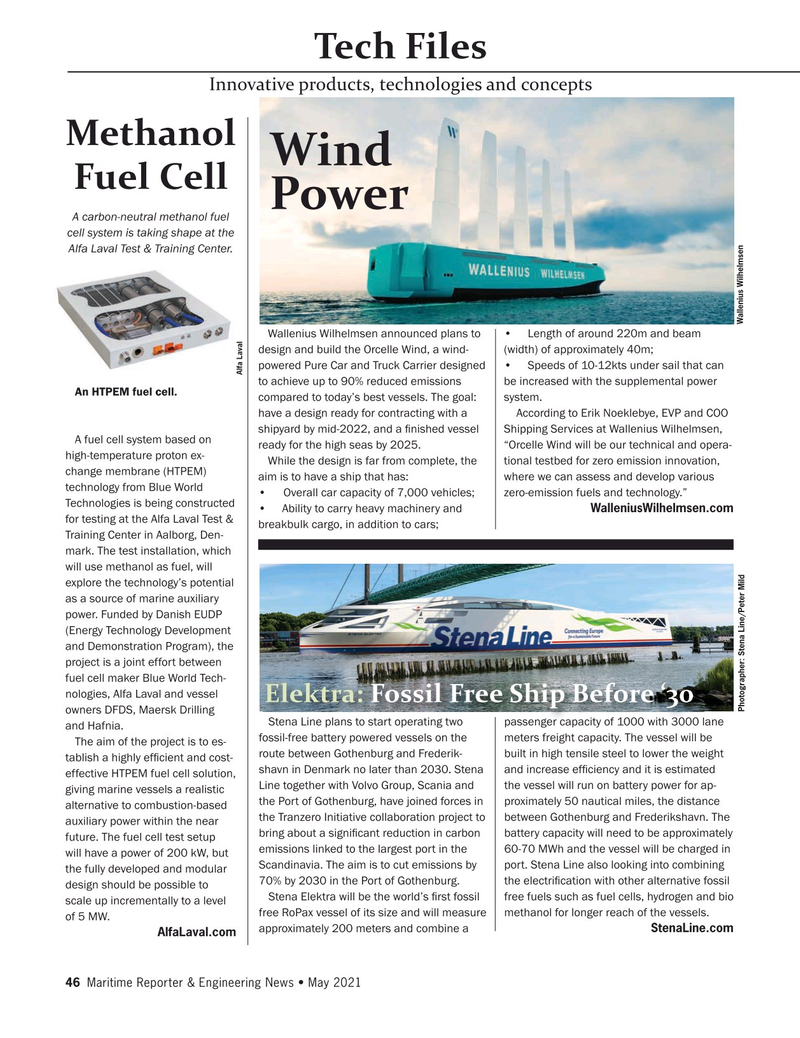
Page 46: of Maritime Reporter Magazine (May 2021)
Green Ship Technologies
Read this page in Pdf, Flash or Html5 edition of May 2021 Maritime Reporter Magazine
Tech Files
Innovative products, technologies and concepts
Methanol
Wind
Fuel Cell
Power
A carbon-neutral methanol fuel cell system is taking shape at the
Alfa Laval Test & Training Center.
Wallenius Wilhelmsen
Wallenius Wilhelmsen announced plans to • Length of around 220m and beam design and build the Orcelle Wind, a wind- (width) of approximately 40m; powered Pure Car and Truck Carrier designed • Speeds of 10-12kts under sail that can
Alfa Laval to achieve up to 90% reduced emissions be increased with the supplemental power
An HTPEM fuel cell.
compared to today’s best vessels. The goal: system.
have a design ready for contracting with a According to Erik Noeklebye, EVP and COO shipyard by mid-2022, and a ? nished vessel Shipping Services at Wallenius Wilhelmsen,
A fuel cell system based on ready for the high seas by 2025. “Orcelle Wind will be our technical and opera- high-temperature proton ex-
While the design is far from complete, the tional testbed for zero emission innovation, change membrane (HTPEM) aim is to have a ship that has: where we can assess and develop various technology from Blue World • Overall car capacity of 7,000 vehicles; zero-emission fuels and technology.”
Technologies is being constructed • Ability to carry heavy machinery and WalleniusWilhelmsen.com for testing at the Alfa Laval Test & breakbulk cargo, in addition to cars;
Training Center in Aalborg, Den- mark. The test installation, which will use methanol as fuel, will explore the technology’s potential as a source of marine auxiliary power. Funded by Danish EUDP (Energy Technology Development and Demonstration Program), the project is a joint effort between fuel cell maker Blue World Tech- nologies, Alfa Laval and vessel
Elektra: Fossil Free Ship Before ‘30
Photographer: Stena Line/Peter Mild owners DFDS, Maersk Drilling
StenaLineplanstostartoperatingtwo passengercapacityof1000with3000l Stena Line plans to start operating two passenger capacity of 1000 with 3000 lane and Hafnia.
fossil-free battery powered vessels on the meters freight capacity. The vessel will be
The aim of the project is to es- route between Gothenburg and Frederik- built in high tensile steel to lower the weight tablish a highly ef? cient and cost- shavn in Denmark no later than 2030. Stena and increase ef? ciency and it is estimated effective HTPEM fuel cell solution,
Line together with Volvo Group, Scania and the vessel will run on battery power for ap- giving marine vessels a realistic the Port of Gothenburg, have joined forces in proximately 50 nautical miles, the distance alternative to combustion-based the Tranzero Initiative collaboration project to between Gothenburg and Frederikshavn. The auxiliary power within the near bring about a signi? cant reduction in carbon battery capacity will need to be approximately future. The fuel cell test setup emissions linked to the largest port in the 60-70 MWh and the vessel will be charged in will have a power of 200 kW, but
Scandinavia. The aim is to cut emissions by port. Stena Line also looking into combining the fully developed and modular 70% by 2030 in the Port of Gothenburg. the electri? cation with other alternative fossil design should be possible to
Stena Elektra will be the world’s ? rst fossil free fuels such as fuel cells, hydrogen and bio scale up incrementally to a level free RoPax vessel of its size and will measure methanol for longer reach of the vessels. of 5 MW.
approximately 200 meters and combine a StenaLine.com
AlfaLaval.com 46 Maritime Reporter & Engineering News • May 2021
MR #5 (34-49).indd 46 5/6/2021 5:03:47 PM

 45
45

 47
47
